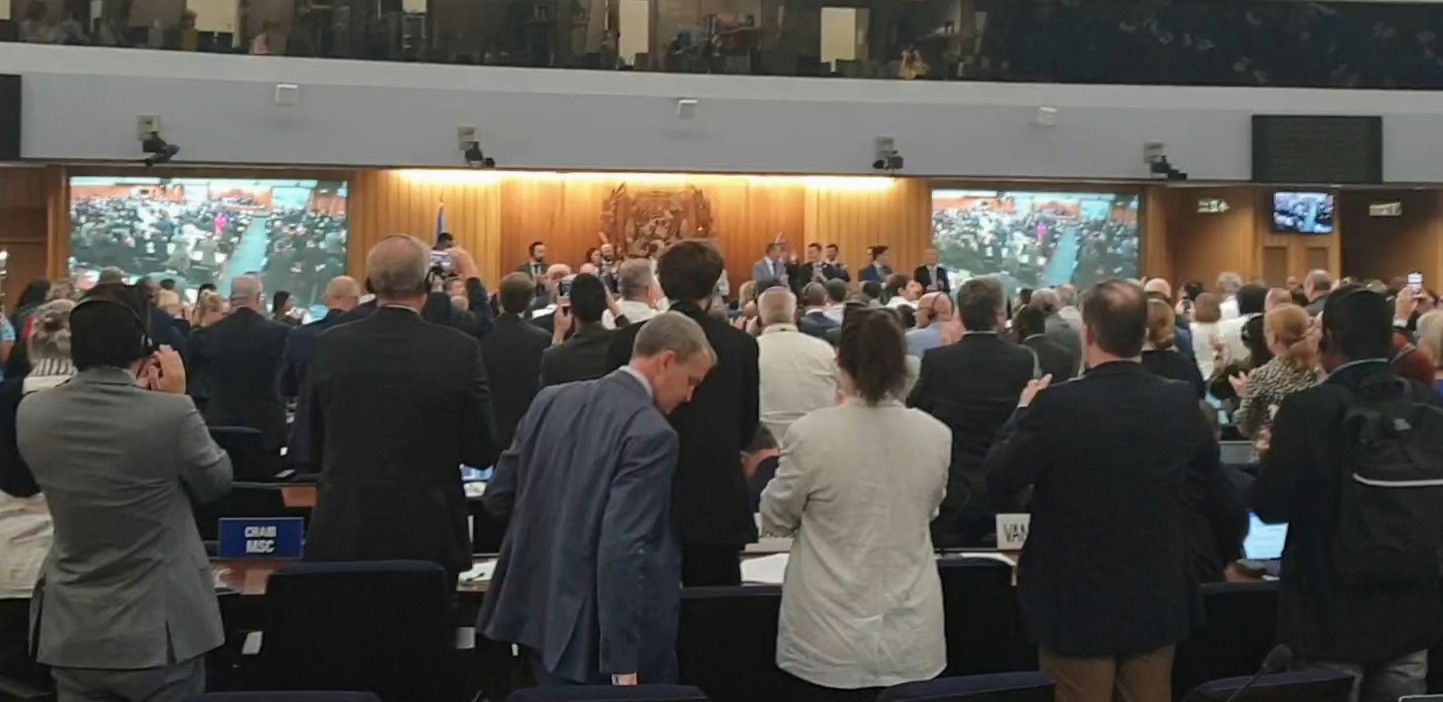Historic day as IMO adopts revised GHG Strategy
There was standing ovation celebrating a historic moment at the IMO today as the Marine Environment Protection Committee adopted the IMO’s Revised GHG Strategy, setting out the ambitions for GHG emissions from international shipping to reach net-zero GHG emissions by or around 2050.
There will be a lot to unpack from MEPC 80 and we’ll provide more detail next week, but here are some highlights:
• The 2023 IMO GHG Strategy identifies levels of ambition for the international shipping sector noting that technological innovation and the global introduction and availability of zero or near-zero GHG emission technologies, fuels and/or energy sources for international shipping will be integral to achieving the overall level of ambition.
• The levels of ambition and indicative checkpoints should take into account the well-to-wake GHG emissions of marine fuels as addressed in the Guidelines on lifecycle GHG intensity of marine fuels (LCA guidelines) developed by the Organization1 with the overall objective of reducing GHG emissions within the boundaries of the energy system of international shipping and preventing a shift of emissions to other sectors.
Within the levels of ambition there are several new elements, including:
• Uptake of zero or near-zero GHG emission technologies, fuels and/or energy sources to increase uptake of zero or near-zero GHG emission technologies, fuels and/or energy sources to represent at least 5%, striving for 10%, of the energy used by international shipping by 2030; and
• Indicative checkpoints to reach net-zero GHG emissions from international shipping have been set to:
.1 reduce the total annual GHG emissions from international shipping by at least 20%, striving for 30%, by 2030, compared to 2008; and
.2 to reduce the total annual GHG emissions from international shipping by at least 70%, striving for 80%, by 2040, compared to 2008.
IBIA is proud to have played a positive role at the IMO and the contributions we have made to the negotiations leading up the IMO’s revised GHG Strategy during two intense weeks of negotiations.
We called for regulations that will encourage investments in alternative fuels and technologies that will reduce GHG on a well-to-wake basis.
We sought clarification on the role of certified sustainable biofuels as a way to improve a ship’s CII rating while we wait for the IMO’s LCA Guidelines to provide a comprehensive method to account for well-to-wake GHG emissions. We now have a circular that sets out interim guidance on the use of biofuels that gives us that clarity.
We brought information on the potential of Ship Board Carbon Capture (SBCC) as a viable option to expedite the reduction of total shipboard CO2 emissions. That work will be taken forward at future GHG discussions at the IMO
We voiced support for the inclusion in the levels of ambition of a minimum requirement for at least 5% of fuels used by international shipping to have zero or near-zero GHG emissions on a life-cycle assessment basis by 2030, to give the starting signal for the phasing in of low and zero emission solutions long before 2050.
The energy transition will take time, hence the IMO’s long-term GHG emission reduction target must be supported by policies that will guarantee steady growth in the uptake of low and zero GHG emission fuels and technologies.
There is much work ahead to decide on the exact nature of the policy tools that will support the GHG reduction targets. It was not possible to narrow down the various proposals and get consensus on that yet, but they will include the phasing in of a marine fuel GHG intensity standard, and some form of a GHG emission pricing mechanism. The aim is to make a final decision on these elements at MEPC 81.
